Photographs: Chad Chapman/Reuters
The prestigious Foreign Policy magazine has released the 2010 Failed States Index. Barring a few shuffles, the top 10 slots on the list are almost the same as the previous year's list.
While Somalia is the most failed state in the world, Norway is the best country on the list. Most of India's neighbours have done poorly comapared to India that has ranked 87th -- Pakistan (10), Burma (16), Bangladesh (24),Sri Lanka (25), and China (62).
"Altogether, the top 10 slots have rotated among just 15 unhappy countries in the index's six years. State failure, it seems, is a chronic condition," the magazine said.
The overall picture in 2010 is no better than previous years, the magazine said, as continued crises are pushing many troubled countries "to the breaking point".
The rankings were decided on the basis of 10 factors: demographic pressures, refugees, group grievance, human flight, uneven development, economic decline, delegimitisation of the state, public services, human rights, security apparatus, factionalised elites and external intervention. The lower a country scored on a criterion out of 10 points, the better it fared on the list.Pakistan is 10th most failed state
Image: Gunmen attacked trucks carrying supplies for Western forces in Afghanistan near Islamabad on June 9Photographs: Faisal Mahmood/Reuters
India and its neighbours:
While India is ranked 87 in a list of 177 countries, many of its neighbours are high above on the list.
Pakistan:
Pakistan is the 10th most failed nation on the list.
The country has scored poor ratings on all factors, the worst being security apparatus (9.7), factionalised elites (9.5) and group grievance (9.4). (On a scale of 1-10, with 1 being the best and 10 being the worst)
Troubled borders with India and Afghanistan and political turmoil within the country has also been a flashpoint for many internal clashes with fanatic Islamist groups and modern secular wing.
After a decade of dictatorial rule by former president Pervez Musharraf, the country held its first legitimate democratic elections in 2008.
The military and intelligence wing of the country plays a huge role in deciding country affairs, and often the decisions are in favour of the Islamic militant groups like the Al Qaeda and the Taliban, which have made the country's hilly regions their safe haven.
US, using Pakistan as a base, has launched a war against the Taliban in the Pakistan-Afghanistan border, while the country's forces have launched campaigns against the Pakistani Taliban.
Frequent factions between rival political parties, regular conflicts within the tribal regions and in Balochistan has led to instability in the country, forcing many youngsters to seek other shores for education and better careers.
Due to the terror attacks, sectional clashes in the country, Pakistanis, especially those in the northern regions, often go without supplies of essential commodities, water and electricity.
Pakistan's wealth is unevenly distributed -- the poorest 10 per cent of Pakistanis account for four percent of the national income, while the richest 10 percent account for over 26 per cent of the income.
Nearly 30 per cent of the country's budget has been allotted for defence in 2010, though it records a trade deficit of nearly $15 billion in 2008 and has an inflation rate of 20.8 per cent.
There have been nearly 180 minor and major blasts in the country in 2010 itself that have killed about 800 people.India is 87th on list
Image: Indian Army's T-90 tanks participate in the Republic Day parade in New Delhi in January 2009Photographs: B Mathur/Reuters
India has maintained its 87th rank and has scored 79.2 points higher than last year. Among the criterion, India has scored poorest for uneven development in the country (8.9) and demographic pressures (8.3) -- perhaps due to the conflict with Pakistan and China over disputed borders.
It has fared best for having a low number of refugees (4.9), for its low economic decline (5.0) in the year and for low external intervention (5.1).
India's other scores were: group grievance (7.3), human flight (6.7), delegimitisation of the state (5.5), public services (7.0), human rights (6.0), security apparatus (7.1) and factionlised elites (6.0).
China is ranked 62
Image: A protester urges for release of Chinese pro-democracy leader Liu Xiaobo in Hong Kong in 2009Photographs: Tyrone Siu/Reuters
China fares worse than Indian and is ranked at 62nd place and has gone down 83 points comapred to 2009.
It has scored low points for uneven development (9.2), demographic pressures (9.0) and human rights (8.9). The country has scored well for low external intervention (3.3) and low economic decline (4.5).
While China's economy may be surging ahead, its human rights have always been under criticism for executing hundreds of people every year and for failing to stop torture.
The rigidly communist country clamps down any dissent among its ethnic minorities, including Muslim Uighurs and Buddhist Tinetans.
India's other neighbours fare badly
Image: A boy walks past soldiers outside the headquarters of the paramilitary Bangladesh Rifles in DhakaPhotographs: Rafiqur Rahman/Reuters
Myanmar:
Myanmar has been placed at 16. Myanmar has been under military rule since 1962, where the Junta stifles all voices of dissent. The army has been accused of gross human rights violationsl, including mass relocations of people and child labour. Heroin trafficking, sectorial factions, rebellions from opposing camps are commonplace.
Democracy leader Aung San Suu Kyi, who won the country's first open elections with a majority mandate in 1990, has been under house arrest since the 1980s and was never allowed to govern.
It is one of Asia's poorest countries and the country's black-market driven economy is rampant with corruption.
Bangladesh:
The densely-populated and one of the South Asia's poorest countries has been ranked at 24. Political tension between two opposing parties has killed thousands in recent years. The country has also been a breeding ground for Islamic militants.
Human rights activist have criticised Bangladesh for frequent assaults on women and torture by police.
Sri Lanka and Nepal:
Sri Lanka is at 25 and Nepal at 26. The Sri Lankan government launched a long conflict against the Hindu-Tamil separatist group, the Liberation Tigers of Tamil Eelam. A number of civilians were killed in the war and human rights activists across the world have accused the government of attrocitiies and war crimes against the Tamils.
Nepal has been struggling with a Maoist rebellion against monarchy for the last decade that frequently threatens to take over the government. The country became a republic afer abolishing monarchy in 2008, before which the native kings ruled the land-locked country.
The most failed nations
Image: A displaced Somali girl carries dishes as she walks past her makeshift shelter in Jabuti refugee camp in south Mogadishu June 20, 2010Photographs: Omar Faruk/Reuters
Somalia:
The failed nations list was topped by Somalia, followed by Zimbabwe, Sudan, and Chad.
The magazine said Somalia saw yet another year plagued by lawlessness and chaos, with pirates plying the coast while radical Islamist militias tightened their grip on the streets of Mogadishu.
Somalia has not had an effective central government since President Siad Barre was overthrown in 1991. Since then, the country has been dealing with lawlessness, fighting between rival warlords, and economic crisis. Famines and diseases have led to the deaths of at least one million people.
Islamist insurgents owing allegiance to the Al Qaeda have gained control of most of southern Somalia and have thrown out the warlords. Also, Somali pirates have become a major threat to international shipping.
Zimbabwe:
A shattered economy, political strife and food shortage have been part of Zimbabwe for the last three decades. A rising inflation, shortage of food and fuel, and shrinking agricultural production are pushing the country to a breaking point.
The Sudan:
Decades of fighting between Arab militia and non-Arab locals have left Sudan in tatters. A civil war in Darfur region of western Sudan has been called one as "one of the worst nightmares in recent history" where the pro-government Arab militias have taken on campaign of 'ethnic cleansing' against non-Arab locals. This in turn has strained relations between Sudan and neighbouring Chad, triggering fears of regional war.
Chad:
Chad faces crises on several fronts: Constant clashes with Sudan's Darafur region; over 2 lakh non-Arab refugees from Sudan have taken shelter here due to ethnic clashes; several groups from Sudan and groups have attempted to murder Chad's president.
The war-torn countries
Image: Children walk as a Canadian soldier patrols in Nakhonay village in Afghanistan in June 2010Photographs: Denis Sinyakov/Rreuters
Afghanistan and Iraq
The American wars against the Taliban in Afghanistan and Iraq have ensured them the sixth and seventh positions respectively in the failed nations list.
Afghanistan and Iraq traded places on the index as both states contemplated the exit of US combat troops. The war-ravaged Democratic Republic of the Congo (which was ranked 5th on the list) once again proved itself a country in little more than name, the magazine said.
The Central African Republic and Guinea ranked eighth and ninth on the list.
Countries that fared the best
Image: Skiers on a chairlift at Les Crosets, 120 kilometres east of Geneva, SwitzerlandPhotographs: Denis Balibouse/Reuters
Norway ranked the lowest in the list (177), preceded by Finland, Sweden and Switzerland respectively.
The magazine noted some improvements on the list -- some countries have made giant leaps towards peace and development compared to the previous years.
"Given time and the right circumstances, countries do recover. Sierra Leone and Liberia, for instance, no longer rank among the top 20 failing states, and Colombia has become a stunning success story," it said.
"Few remember today that the Dominican Republic once vied with its neighbor Haiti for the title of 'worst Caribbean basket case'."


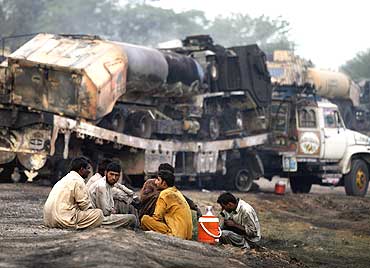
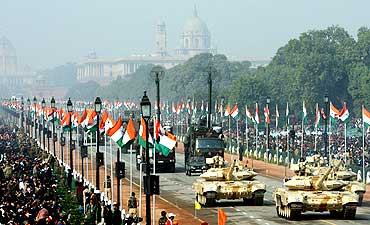
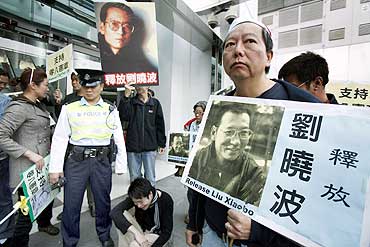
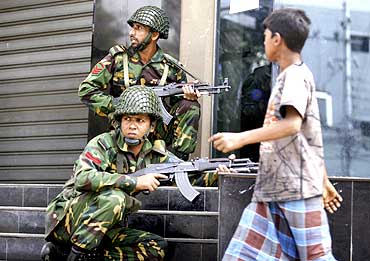
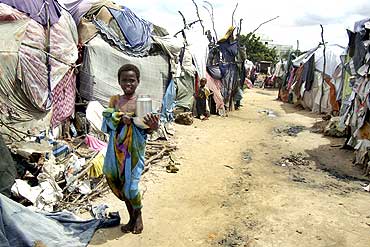
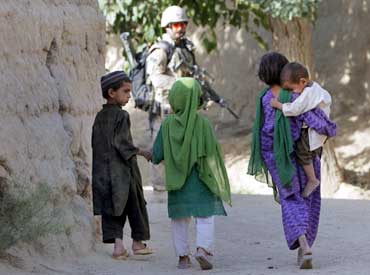
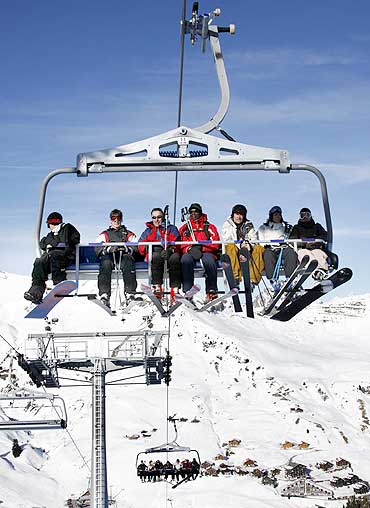
article